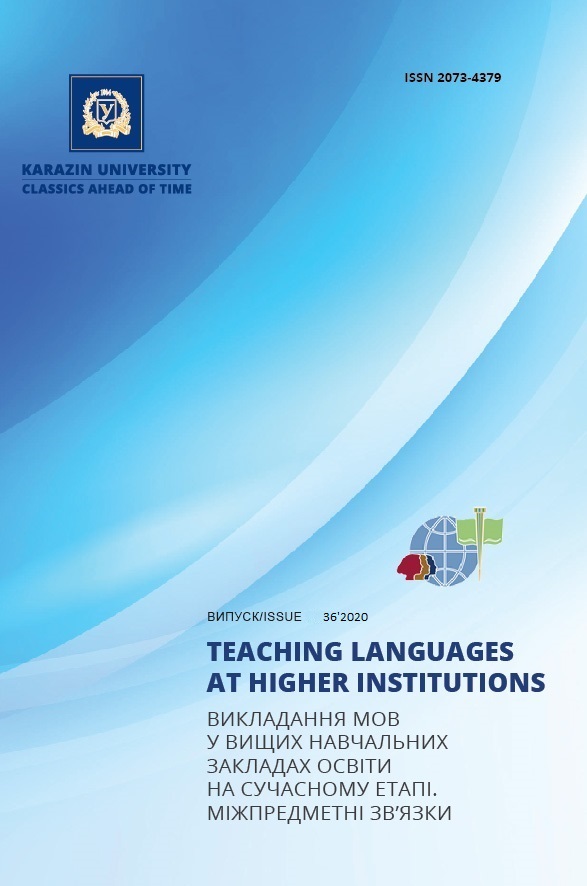Формування мовних і мовленнєвих умінь і навичок ведення діалогу-розпитування «лікар − хворий» на заняттях з української мови як іноземної
Анотація
У статті з’ясовано важливість опанування іноземними студентами медичних університетів умінь й навичок ведення професійного діалогу «лікар − хворий» як одного з основних видів мовленнєвої діяльності в майбутній професії. Здійснено аналіз методичної літератури з порушеного питання. Визначено поняття «фахова мова», «спеціальна мова», «фахова готовність», «медична розмовна мова» з метою розуміння вимог до мовних знань, мовленнєвих навичок майбутніх лікарів. Визначено структуру, наповнення, завдання професійного діалогу «лікар – хворий». Виокремлено вступну, основну та заключну частини професійного діалогу. Описано особливості кожної зі згаданих частин щодо лексико-граматичного наповнення. Підкреслено, що частини мають різне спрямування: завданням вступної частини є налагодження контакту з хворим, основної – отримання потрібної інформації від пацієнта для успішного подальшого лікування, заключної – подання чітких і зрозумілих рекомендацій та досягнення домовленості щодо наступних дій. Окреслено навчальний матеріал, який доцільно розглянути зі студентами-інокомунікантами під час курсу. Запропоновано види робіт для розвитку культури професійного мовлення. Встановлено, що формування комунікативних завдань, а також усвідомлення шляхів їхньої реалізації за допомогою комунікативних стратегій та тактик є обов’язковими навичками для майбутніх медичних працівників. Виявлено, що кожна зі структурних частин професійного діалогу містить етикетні одиниці, а тому від студентів вимагається знання відповідних лексем, уміння правильного їхнього використання, розуміння впливу цих одиниць на свідомість співрозмовника. Зроблено акцент на важливості засвоєння іноземними студентами певних мовленнєвих жанрів для успішного проходження майбутньої практики в медичних закладах: запрошення, наказ, прохання, рекомендація, зауваження тощо.
Завантаження
Посилання
Ananyeva, L.V. (2000). Modelyuvannya zmistu navchannya profesiyno-pedagogichnogo dialogu ta yogo realizaciya na pochatkovomu stupeni navchannya u movnomu vuzi [Simulation of the content of teaching of professional pedagogical dialogue and its implementation at the initial stage of training in a language university]. Inozemni movy [Foreign languages], 4. pp. 22–26 [in Ukrainian].
Barsuk, S. (2016). Pedagogichni umovy formuvannya inshomovnogo profesiynogo movlennya mayjbutnih sudnovodiyiv na zasadah komunikatyvno-kognityvnogo pidhodu [Pedagogical conditions for the formation of foreign language professional speech of future navigators on the basis of communicative-cognitive approach]. Candidate’s thesis. Kherson: Kherson State University [in Ukrainian].
Drozdova, I.P. (2009). Providni pryncypy profesiynogo movlennya studentiv nefilologichnyh specialnostej zasobamy ukrayinskoyi movy [Leading principles of professional speech of students of non-philological specialties by means of the Ukrainian language]. Vykladannia mov u vyshchykh navchalnykh zakladakh osvity na suchasnomu etapi. Mizhpredmetni zviazky [Teaching Languages at Higher Institutions]. Kharkiv: V.N. Karazin Kharkiv National University, 15, pp. 56–62 [in Ukrainian].
Ivanyshyn, G. (2010). Lingvodydaktychna model navchannya profesiyno zoriyentovanogo dialogichnogo movlennya inozemnyh studentiv medychnyh vuziv [Linguistic model of teaching professionally oriented dialogic speech to foreign medical students]. Teoretychna i dydaktychna filologiya [Theoretical and didactic philology], 17, pp. 38–49 [in Ukrainian].
Lisovyy, M.I. (2010). Kultura profesiynogo movlennya: navchalnyy posibnyk dlya studentiv vyshhyh medychnyh navchalnyh zakladiv [Professional speech culture: a textbook for higher medical students]. Vinnitsa: NOVA KNYGA [in Ukrainian].
Luczak, S.M. and Lytvynenko, N.P. (Eds.) (2017). Ukrayinska mova (za profesiynym spryamuvannyam) [Ukrainian language (for professionals)]. Kyiv: VSV Medycyna [in Ukrainian].
Shvecz, G. (2008). Rozvytok navychok dialogichnogo movlennya pry vyvchenni ukrayinskoyi movy v inshomovniy audytoriyi [Development of dialogue skills in studying Ukrainian in a foreign language audience]. Teoriya i praktyka vykladannya ukrayinskoyi movy yak inozemnoyi [Theory and practice of teaching Ukrainian as a foreign language], 3, pp. 300–311 [in Ukrainian].
Tsurkan, M.V. (2018) Pidgotovka anglomovnyh studentiv-medykiv do vedennya profesiynogo dialogu na zanyattyah iz ukrayinskoyi movy yak inozemnoyi [Рreparation of English-speaking medical students for conducting a professional dialogue in Ukrainian as a foreign language]. In: VII Mizhnarodna naukovo-praktichna konferentsiya “Mova i socium: etnokulturnyj aspekt” [The seventh International scientific conference “Language and society: an ethnocultural aspect”]. Berdyansk: Berdyansk State Pedagogical University, pp. 99–101 [in Ukrainian].

